 Petzlover
Petzlover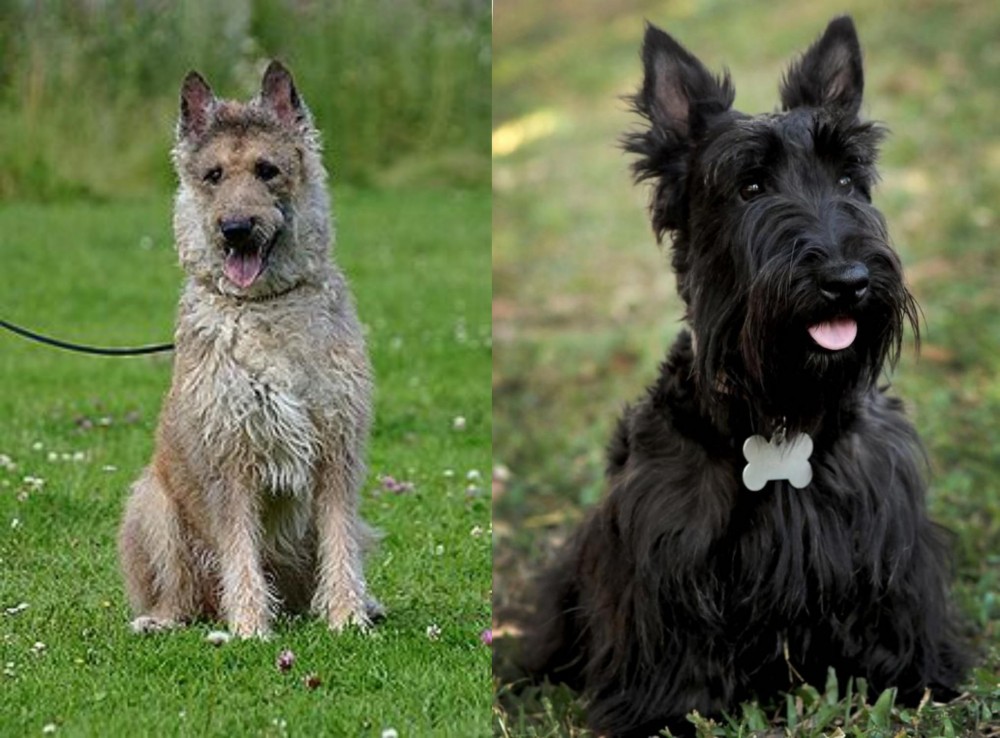 Belgian Shepherd Dog (Laekenois) is originated from Belgium but Scoland Terrier is originated from United Kingdom. Belgian Shepherd Dog (Laekenois) may grow 39 cm / 16 inches higher than Scoland Terrier. Belgian Shepherd Dog (Laekenois) may weigh 20 kg / 45 pounds more than Scoland Terrier. Both Belgian Shepherd Dog (Laekenois) and Scoland Terrier has almost same life span. Belgian Shepherd Dog (Laekenois) may have more litter size than Scoland Terrier. Belgian Shepherd Dog (Laekenois) requires Low Maintenance. But Scoland Terrier requires High Maintenance
Belgian Shepherd Dog (Laekenois) is originated from Belgium but Scoland Terrier is originated from United Kingdom. Belgian Shepherd Dog (Laekenois) may grow 39 cm / 16 inches higher than Scoland Terrier. Belgian Shepherd Dog (Laekenois) may weigh 20 kg / 45 pounds more than Scoland Terrier. Both Belgian Shepherd Dog (Laekenois) and Scoland Terrier has almost same life span. Belgian Shepherd Dog (Laekenois) may have more litter size than Scoland Terrier. Belgian Shepherd Dog (Laekenois) requires Low Maintenance. But Scoland Terrier requires High Maintenance
 The Laekenois, from a variety of 4 Belgian Shepherds, and one of the rarest, is a working- or herding breed of dog which originated in Belgium. It is believed to have been around since the Middle Ages. The intelligent dog was also used for sending messages during the 1st World War. In most countries, all 4 of the dogs are considered the same breed with different varieties in coat types, but there are some instances where they are recognized as separate breeds.
The Laekenois, from a variety of 4 Belgian Shepherds, and one of the rarest, is a working- or herding breed of dog which originated in Belgium. It is believed to have been around since the Middle Ages. The intelligent dog was also used for sending messages during the 1st World War. In most countries, all 4 of the dogs are considered the same breed with different varieties in coat types, but there are some instances where they are recognized as separate breeds.
An interesting aspect of these dogs is that until the advent of dog shows in the 1900s, the 4 varieties were intermixed, and today purebred Laekenois can sometimes give birth to smooth-coated puppies which can be registered as Malinois.
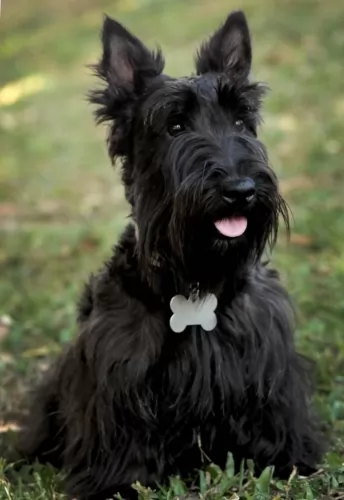 Not much is known about the Scoland Terrier. It is not a purebred but rather a crossbreed developed by crossing the Scottish Terrier with the Westland Terrier. To understand these mixed breeds, look to the original breeds for any combination of the characteristics of the breeds. The offspring of this crossing is not a 50-50 split of the original breeds looks or temperament.
Not much is known about the Scoland Terrier. It is not a purebred but rather a crossbreed developed by crossing the Scottish Terrier with the Westland Terrier. To understand these mixed breeds, look to the original breeds for any combination of the characteristics of the breeds. The offspring of this crossing is not a 50-50 split of the original breeds looks or temperament.
Because the Scoland Terrier is a mix between the Scottie and the Westie he has all the characteristics of a typical terrier perhaps even twice as much. With both parents being terriers, you can expect your Scoland to act like a short legged terrier. These dogs are known for their courage and tenacity. Today these terriers are family companions. Most terriers today come from a pool of ancestral dog in the 19th century in Europe. This information was gleaned from a genetic analysis done in 2006.
The Scoland Terrier, being a hybrid, is not acknowledged by the American Kennel Club (AKC) or the United Kennel Club (UKC). It is acknowledged by the International Designer Canine Registry (IDCR), American Canine Hybrid Club (ACHC), Dog Registry of America, Inc. (DRA), Designer Dogs Kennel Club (DDKC) and Designer Breed Registry (DBR).
 The Laekenois is a highly talented dog, highly energetic and extremely intelligent. He will make a superb family pet with owners who are firm and fair with him. The dog is bright, obedient, protective and somewhat territorial. He’ll guard what he believes is his as he is instinctively protective.
The Laekenois is a highly talented dog, highly energetic and extremely intelligent. He will make a superb family pet with owners who are firm and fair with him. The dog is bright, obedient, protective and somewhat territorial. He’ll guard what he believes is his as he is instinctively protective.
He will get on well with children in the home, and he can also be socialized to get on well with other pets in the home. Of course, the way an owner treats the dog, and any other dog for that matter, brings out different temperaments in a dog. To get the best from him he should be trained and socialized from an early age. He will need plenty of exercise if you don’t want him becoming destructive from sheer boredom.
The body is well proportioned, muscular and sturdy. He has an alert, intelligent face with erect ears, bright brown eyes and the nose black. The hair is dense on the long tail, but with no feathering like with the other breeds. The most common color is fawn with a reddish undertone. The chest is deep and the legs strong and straight. The Laekenois's medium length rough, wire coat can include colors from fawn to brownish and black in between.
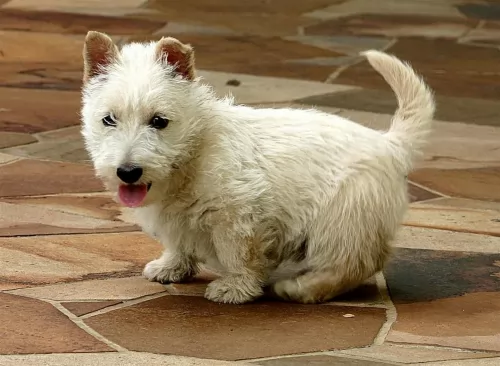 Being a hybrid, the Scoland Terrier will not always look alike and could look like a Scottie, a Westie or a combination of the two. Most breeders of this designer dog say it usually has a body like the Scottie and a round head like the Westie. They are more often black with white markings, but they can often be wheaten as well. With round dark eyes, a scissors bite and black nose, her face is unique. The breed has erect and small, triangular ears and a medium fluffy tale. The coat is hard and wiry, with a dense soft undercoat.
Being a hybrid, the Scoland Terrier will not always look alike and could look like a Scottie, a Westie or a combination of the two. Most breeders of this designer dog say it usually has a body like the Scottie and a round head like the Westie. They are more often black with white markings, but they can often be wheaten as well. With round dark eyes, a scissors bite and black nose, her face is unique. The breed has erect and small, triangular ears and a medium fluffy tale. The coat is hard and wiry, with a dense soft undercoat.
 The Belgian Laekenois is an energetic herding breed dog, and even though he will do well in an apartment if he is sufficiently exercised, big gardens and farms would be first choice for him. Wherever you offer him a home, make sure to exercise him regularly and give him plenty of attention, as he loves his human family.
The Belgian Laekenois is an energetic herding breed dog, and even though he will do well in an apartment if he is sufficiently exercised, big gardens and farms would be first choice for him. Wherever you offer him a home, make sure to exercise him regularly and give him plenty of attention, as he loves his human family.
He’ll make an exceptional watchdog and because he is so intelligent, he learns easily, responding readily to his owner’s instruction. He’ll protect his human family with his life. Social, lively, attractive and bright, anybody who has owned a Laekenois will vouch for his loyalty and devotion, making him a splendid pet.
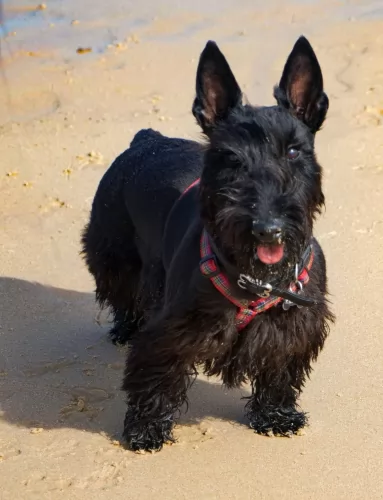 1.Children friendliness - they can be very good with children and children can help them get their exercise.
1.Children friendliness - they can be very good with children and children can help them get their exercise.
3.Adaptability - yes but she is adept at digging and must have a safe enclosure.
 The lifespan of the Belgian Laekenois is between 10 and 14 years of age, and he is a pretty robust breed, not prone to getting sick easily. However, as with most other dog breeds, he is predisposed to some concerning health conditions.
The lifespan of the Belgian Laekenois is between 10 and 14 years of age, and he is a pretty robust breed, not prone to getting sick easily. However, as with most other dog breeds, he is predisposed to some concerning health conditions.
A frightening health issue in Belgian Shepherds is inherited epilepsy. It occurs in all four varieties. Your dog will have uncontrollable shaking that can last a few minutes. There are many causes of seizures but it is mostly an inherited disorder.
The most common eye disease is cataracts.
This is an inherited disease that causes the joints to develop improperly. He may even have difficulty getting up from lying down.
 This hybrid dog can inherit any of the issues faced by its two parent breeds. For the Scoland Terrier this can include:
This hybrid dog can inherit any of the issues faced by its two parent breeds. For the Scoland Terrier this can include:
• Seborrhea – Skin disease that can cause dogs to scratch until bleeding and/or infected.
• Carniomandibular Osteopathy -called lion’s jaw this is a developmental disease that causes extensive changes in the bones of the mandible and skull.
• Pulmonic Stenosis – when the blood flowing from the heart’s right ventricul to the pulmonary artery is blocked.
• PPM or Persistent Pupillary Membranes - causes visual impairment when the membranes do not dissolve after birth.
• Chronic Hepatitis – disease of the liver that can eventually cause major damage.
 The long, double coat of your Laekenois will need to be trimmed about twice a year otherwise he could look dirty and unkempt. Certainly with the coat he has, you will need to brush him at least twice a week to get rid of all those loose hairs.
The long, double coat of your Laekenois will need to be trimmed about twice a year otherwise he could look dirty and unkempt. Certainly with the coat he has, you will need to brush him at least twice a week to get rid of all those loose hairs.
He is a well muscled, athletic, energetic dog and his food, whether home-made or commercially manufactured, needs to be a high-quality food high in protein and packed full of minerals and vitamins. If you’re not sure about food type, speak to your vet, because as a dog expert, they will advise you on food appropriate to this dog breed and his energy needs. Whether you own a male or female Laekenois, feeding should be such that weight for an adult is maintained around 25–30kg.
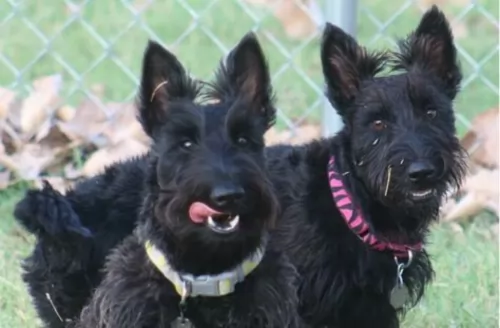 1.Feeding the puppy - Give a high quality puppy dog food designed for terriers or active medium sized dogs. Give ¾ of a cup over 3 meals a day.
1.Feeding the puppy - Give a high quality puppy dog food designed for terriers or active medium sized dogs. Give ¾ of a cup over 3 meals a day.
2.Feeding the adult – Give a high quality adult dog food designed for terriers or active medium sized dogs. Give one cup over two meals a day.
4. Games and Exercises – The Scoland Terrier is a very active dog and needs daily exercise, He need time to play, run, and be stimulated by games. She would be very good at flyball, Frisbee, fetch, agility, barn hunt, and obedience. He needs at least 2 hours of play and exercise everyday.